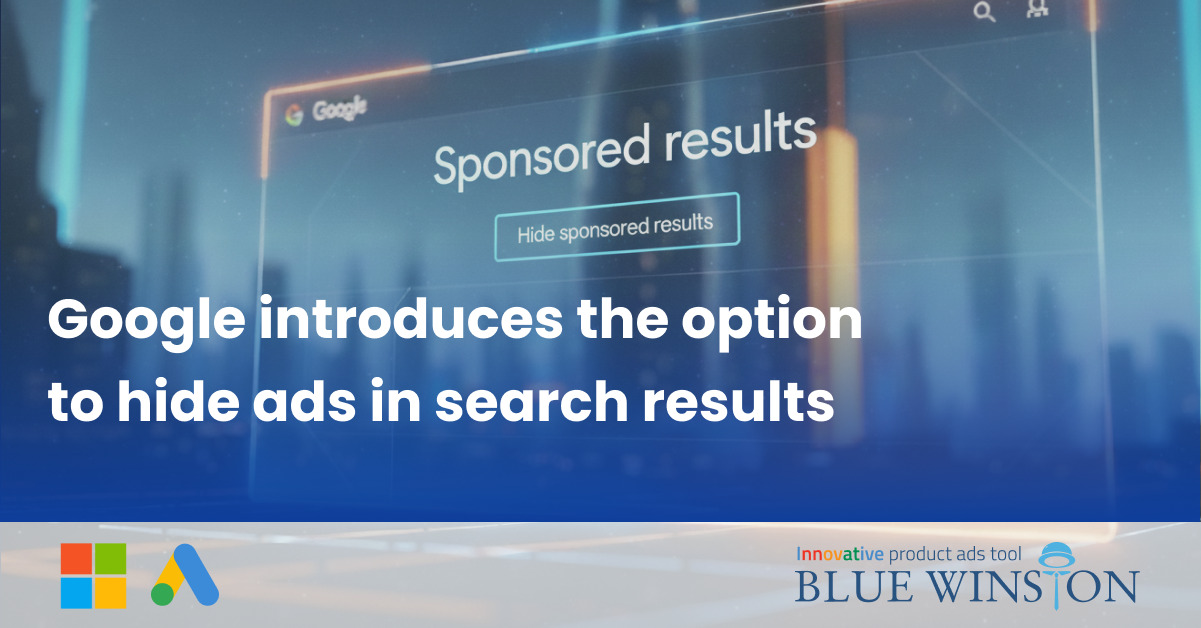Google, the largest search engine, is introducing a quiet but technologically significant change in the display of search results. For the first time in history, it is giving users the option to decide for themselves whether they want to see sponsored results or not. This feature, available globally, is changing the way we interact with search interfaces and, with it, the dynamics of online advertising as a whole.
How does this feature work?
When searching for any query that triggers advertising campaigns, sponsored results are grouped under a new heading called “Sponsored results.” This is a clearly identifiable visual element that is statically anchored within the ad block and remains visible even when scrolling, preventing confusion between paid and organic content.
Source: Google Ads & Commerce Blog
Below this block, there is a new interactive button that allows you to hide all sponsored links at once. Once activated, the advertising segment will be immediately removed from the display without the need for any further intervention or settings.
Source: Google Ads & Commerce Blog
Technologically, this is a client-side display adjustment, which means that ads are loaded in the background (e.g., for analytics and reporting purposes) but are not presented in the visual output, minimizing their impact on the user.
Source: Google Ads & Commerce Blog
Impact on user experience
From a user perspective, this change represents a step towards greater transparency and control over the search environment. Users can choose whether they want to see ads or focus exclusively on organic content.
At the same time, it is a response to long-standing criticism regarding the unclear labeling of ads, which in the past were visually very similar to unpaid results. The new system clearly separates these two layers of content and gives users the opportunity to actively decide what they prefer.
Impact on advertisers and advertising campaigns
From the advertisers’ perspective, this change brings several challenges, but also potential benefits.
- Reduction in impressions
If a large proportion of users hide ads, there will be a natural decline in impressions, which may negatively affect the performance of campaigns optimized for broad reach. - Higher audience quality
Conversely, those who keep ads visible may represent a more relevant audience, willing to respond to advertising content. This can increase both conversion rates (CVR) and return on ad spend (ROAS). - A challenge for creativity and targeting
Unattractive or poorly targeted ads will be easily ignored. Advertisers will be forced to work with higher-quality content, better targeting, and more sophisticated advertising strategies. Automated campaigns without precise segmentation will suffer the most. - Change in data interpretation
Reported data may show a reduced CTR without any apparent change in budgets. It will be necessary to work with new audience quality metrics and analyze who actually sees the ads.
Technical aspect
Invisible, but still present…
Even after hiding ads, Google’s advertising systems can still rely on passive data. For example, that an ad has been loaded (even if not displayed). As a result, some metrics in Google Ads or Analytics may seem counterintuitive, especially in cases where there are a large number of impressions without adequate interaction. Advertisers should update their reporting models to reflect new user behavior.
Conclusion
The introduction of the option to hide ads in search results is a clear signal that Google is responding to the demand for greater transparency and control. For users, this is a positive step towards a more personalized, less intrusive internet.
For advertisers, however, it means the need to adapt. In the new environment, only those campaigns that can attract attention with their content, form, and relevance will survive. Once again, the old rule applies: in digital marketing, it is not the strongest who wins, but those who can adapt the fastest.
 Get Microsoft Ads setup, tools and coupon for
Get Microsoft Ads setup, tools and coupon for  free!
free! 







